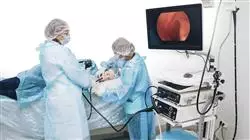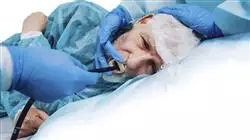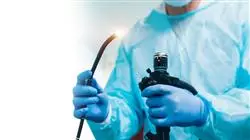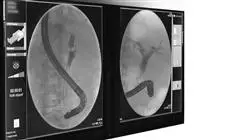University certificate
The world's largest faculty of medicine”
Description
TECH offers you the most complete program in Oncologic Endoscopy in the academic panorama, with the latest educational technology so that you can get the most out of the entire syllabus"

The increasingly advanced knowledge of techniques such as submucosal endoscopic dissection or the improvement in the optical diagnosis of lesions thanks to chromoendoscopy and magnification have allowed specialist to have a greater mastery in the staging and treatment of lesions in the gastrointestinal tract.
TECH is aware of the importance of a comprehensive update on the latest developments and research for the medical specialist, so it has brought together in this degree a great teaching team with international experience in the management of the most complex oncological pathologies. With a particular focus on digestive system disorders, the specialist will find 10 complete teaching modules where they can continue to update their daily work methodology.
Thus, the syllabus reviews conditions such as Barrett's esophagus, gastric lymphomas, duodenal polyps, infiltrating colon neoplasms, pancreatic neuroendocrine tumors and other disorders of the digestive system from an innovative and rigorous perspective. It also includes the possible complications that may be encountered when approaching Oncologic Endoscopy and how to overcome them with the latest technological and theoretical advances.
In addition, knowing how difficult it is for the most demanding specialists to take this program, TECH offers it in a completely online format. This implies that there are no pre-set classes or schedules, being the specialist the ones who decide when, where and how to take it, even from the comfort of their own home. The contents are accessible 24 hours a day from any device with an internet connection, being the teaching adaptable to any type of personal or professional pace.
Take advantage of this online degree and update your knowledge in Oncologic Endoscopy without giving up your professional or personal activities"
This professional master’s degree in Oncologic Endoscopy contains the most complete and up-to-date scientific program on the market. The most important features include:
- The development of case studies presented by experts in Oncologic Endoscopy
- The graphic, schematic, and eminently practical contents with which they are created, provide scientific and practical information on the disciplines that are essential for professional practice
- Practical exercises where the self-assessment process can be carried out to improve learning
- Its special emphasis on innovative methodologies
- Theoretical lessons, questions to the expert, debate forums on controversial topics, and individual reflection work
- Content that is accessible from any fixed or portable device with an Internet connection
The most advanced endoscopy can be a challenge for the specialist who does not have an advanced and current mastery. Learn more about techniques such as enteroscopy or ERCP in this TECH program"
The program’s teaching staff includes professionals from the sector who contribute their work experience to this training program, as well as renowned specialists from leading societies and prestigious universities.
The multimedia content, developed with the latest educational technology, will provide the professional with situated and contextual learning, i.e., a simulated environment that will provide immersive training programmed to train in real situations.
This program is designed around Problem-Based Learning, whereby the professional must try to solve the different professional practice situations that arise during the academic year. For this purpose, the student will be assisted by an innovative interactive video system created by renowned and experienced experts.
Update your skills in the most modern resection techniques, including polypectomy, mucosectomy and endoscopic submucosal dissection"

Access to first class didactic material, with real clinical cases where you will be able to see in context the most recent scientific postulates on oncologic endoscopies"
Objectives
Since the most current advances in endoscopy require frequent renewal of knowledge in this field, this TECH degree offers medical specialists a complete review of all the most recent research and developments. Analyzing in each module the oncological complications of the esophagus, stomach, small intestine, pancreas or gallbladder, the specialist will be renewing all his knowledge in this field to continue offering the best possible health care.

TECH’s objective is the same as yours. You will find the best academic health offer, supported by professional specialists who enrich the syllabus with their advanced experience in endoscopic treatments"
General Objectives
- Develop the necessary medical knowledge on endoscopic techniques of gastrointestinal tumor pathology related to diagnosis, treatment and complications in order to improve the quality of patient care
- Delve into the knowledge of the most commonly used endoscopic techniques in oncologic pathology in order to optimize their use in routine clinical practice
Specific Objectives
Module 1. Oncologic Endoscopy
- Deepen in the different modalities of optical diagnosis of lesions of the gastrointestinal tract, such as chromoendoscopy both with staining and virtual and magnification
- Develop the different quality criteria in endoscopy, as well as to optimize the management of antiplatelet and anticoagulant medication for our patients in order to perform endoscopic procedures
- Internalize the different morphological and anatomopathological classifications of gastrointestinal tract lesions and their implications for subsequent treatment
Module 2. Echoendoscopy and ERCP
- Deepen in the techniques of echoendoscopy and ERCP as well as the necessary material to develop the procedures in the oncological field
- Manage the development of an ampulectomy having clear indications and contraindications of the technique
- Internalize different techniques performed by echoendoscopy that can improve the quality of life of the oncologic patient, such as celiac plexus neurolysis
Module 3. Resection Techniques
- Master the knowledge of submucosal endoscopic dissection in order to strengthen the theoretical knowledge of a highly complex technique
- Control the different variants of mucosectomy that will allow us to obtain a higher success rate in the resection of the different lesions
- Deepen in the necessary material for the development of the technique which will allow choosing the most optimal material according to the lesion to treat
- Develop the different techniques that help us to facilitate submucosal endoscopic dissection
- Professionalize the endoscopic management of the different complications derived from resection
Module 4. Esophageal
- Optimize Give the optical diagnosis of the different superficial esophageal neoplasms
- Master the different treatments available for Barrett's esophagus and their indication
- Understand the role of endoscopy in the management of post-surgical complications such as suture dehiscence
- Control the different endoscopic treatments that can be performed depending on the lesions observed
Module 5. Stomach
- Optimize the optimal diagnosis of the different gastric superficial neoplasms
- Deepen the different risk factors for the development of gastric cancer in order to be able to adequately follow up patients
- Internalize the different endoscopic treatments that can be performed depending on the lesions observed
Module 6. Small Intestine
- Develop knowledge on the diagnosis of small bowel lesions
- Deepen in the use and indications of capsule endoscopy as well as the contraindications and management of complications derived from its use
- Know the different enteroscopy techniques
- Learn the indications for small bowel exploration according to the pathology of the patient
Module 7. Colon and Rectum
- Develop the ability to stage patients according to their risk of developing colon and rectal cancer, and to know the different recommendations for follow-up
- Optimize the optimal diagnosis of superficial neoplasms of the colon and rectum
- Master the different endoscopic treatments that can be performed depending on the lesions observed
- Learn the role of endoscopy in the detection of advanced neoformations of the colon and rectum
- Delve into the different hereditary syndromes and the different endoscopic findings that they will present
Module 8. Pancreas
- Deepen in the epidemiology, risk factors, clinical presentation of pancreatic adenocarcinoma
- Develop the new endoscopic techniques available for the palliative treatment of pancreatic cancer
- Know all benign and malignant pancreatic cystic lesions
- Learn more about other pancreatic tumors, their main characteristics, as well as their diagnosis and prognosis
- Recognize the types of pancreatic duct stenosis and the endoscopic solutions that can be offered
Module 9. Gallbladder and Bile Duct
- Internalize the types of cholangiocarcinomas, as well as the diagnosis and clinical presentation Staging of bile duct tumors with the aid of echoendoscopy
- Manage the complications that may arise in bile duct drainage, as well as endoscopic solutions. The alternatives to endoscopic drainage of the biliary tract will also be explained
- Master biliary cysts and their diagnosis, as well as their endoscopic management
- Recognize the risk factors that exist for the development of gallbladder cancer and the findings found on echoendoscopy
Module 10. Latest Advances in Endoscopy
- Master the indications for Full Thickness Resection and the development of the technique
- Develop the role of radiofrequency both in biliary tract tumor pathology and in the treatment of actinic proctitis secondary to radiotherapy
- Discover the possibilities presented by artificial intelligence and its possible future use for injury detection

Your professional goal to remain the best specialist in your field is possible thanks to this advanced TECH program"
Professional Master's Degree in Oncologic Endoscopy
The Professional Master's Degree in Oncologic Endoscopy at TECH Global University is a comprehensive program that covers all aspects of endoscopy in the context of cancer. Participants acquire in-depth knowledge about the different types of cancer and how they affect the digestive, respiratory and urological systems, among others. In addition, they are provided with comprehensive training in specific endoscopic techniques for the detection, diagnosis and treatment of cancer. This program emphasizes new technologies used in the field of oncologic endoscopy. Students learn about the latest advances in instrumentation, such as high-definition endoscopes, advanced imaging systems and real-time imaging techniques, which allow for more detailed and accurate visualization of tissues, facilitating the detection of cancerous lesions and improving procedural accuracy. Early detection is crucial to improve survival rates and quality of life for patients. With solid training in endoscopic techniques, participants acquire the ability to identify potential precancerous traumas and early stage cancers, allowing for timely and effective interventions. Graduates of the program will be able to employ various surgical methods such as endoscopic resection of tumors and ablation of precancerous lesions, which are minimally invasive procedures that offer comparable results to traditional surgeries, but with fewer complications and less recovery time. These techniques can also be used in combination with other treatments, such as radiation therapy and chemotherapy, to improve overall outcomes.
Benefits of choosing this program
The Professional Master's Degree in Oncologic Endoscopy at TECH Global University provides graduates with a wide range of career opportunities in the field of medical oncology. The demand for specialists in oncologic endoscopy is increasing due to the importance of early detection and effective treatment of cancer. Acquiring specialized skills in oncologic endoscopic techniques provides graduates with a competitive advantage in the job market and the ability to contribute significantly to the care and well-being of cancer patients.







